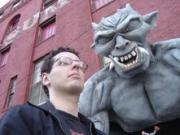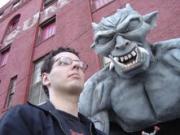
John Donne – A poem can be holy. As a severely lapsed Catholic, I usually find poetic references to God trite. Then I read this, the power of which made me long for such longing.
Charles Bukowski – A poem does not need to be holy. 21 year old males have an annoying tendency to laud Bukowski’s genius while literature professors dismiss him as a drunken hack. But both groups miss the mark. Hank was a genius and a drunk. He wrote clear, uncluttered poems that spoke directly to the heart. Scoff at his grimy subject matter and lack of craft, but he wrote diligently and without concern for trends, a practice a lot of would-be poets should consider emulating. To Bukowski, a poem did not need to be holy or beautiful; it just needed to be honest.
Antonin Artaud – A poem can be both lyrical and obscene. Never before have I encountered poetry simultaneously so ugly and beautiful. Artaud was stubborn, to be sure, but his resistance to the rules of surrealism allowed him to break from the confines of a movement that really should not have had any to begin with. The results are often stunning, immoral, ugly, and compelling.
Nick Laird – Poetry requires slowing down. I’ll paraphrase form a very interesting piece Laird wrote for the Guardian: In the age of Twitter, poetry is more important than ever. Information is now delivered at lightning speed, and while this is not a bad thing, there’s no denying it has altered (ruined?) our collective attention span. We are becoming trained to think that immediacy equals quality. The antidote? Poetry. What other art form requires one to slow down in order to digest it fully?
Joseph Brodsky – The rejection of poetry condemns one to linguistic mediocrity. Again, this is a paraphrase, but Brodsky advocated for poetry throughout his life in order to rescue his age from empty rhetoric, political hucksterism, and other forms of banality.
Aharon Shabtai – Poetry should be provocative. I mean, just read this.
Nicanor Parra – Everything is fodder for poetry. Well into his 90s (pushing 100!), Parra is still producing poems. Some are arresting in their ambition; others are simply hilarious. The way to approach writing might be to do as this antipoet has always done: to shake off elevated diction and just write. The lesson: there is nothing that can’t find its way into poetry.
Ciaran Carson – Clarity and precision are everything. Carson’s best work is clear, focused, and devastating. Look no further than his landmark collection Belfast Confetti, a book of long lines and prose poems that crackles rather than rambles. No small feat.
Vladmir Mayakovsky – Clarity and Precision are nothing. The futurists were concerned with movement, not tradition. Mayakovsky evinced these concerns in his strange, expansive poems. Sure, the images are obscure and the poems are ripe for editing, but MFA tendencies would rob this work of its unique quality.
Walt Whitman – A poem is never finished (but maybe it should be). Ever read Leaves of Grass? Okay, which edition? If you’ve decided the so-called deathbed edition is best, as it is most complete, you’re missing the exuberance of the 1855 draft of “Song of Myself”—perhaps the finest poem written by a North American. Later editions of the expanding Leaves of Grass altered the tone and bogged down the early poems with some lesser works. It’s a mixed bag, though still pretty untouchable. The lesson: no poem is ever finished in the eyes of the poet, but in the eyes of the reader the poem has an end. Constant tinkering can ruin a perfectly good poem. Ultimately, you need to learn to step back and move on.


